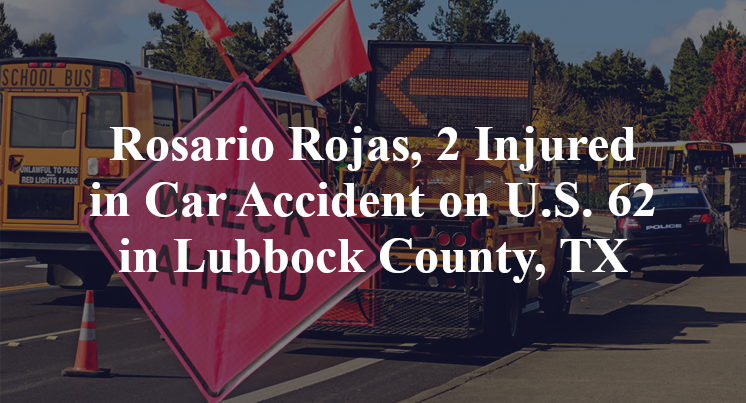Rosario Rojas, 2 Injured in Car Accident on U.S. 62 in Lubbock County, TX
Lubbock County, TX — August 11, 2024, Rosario Rojas and two others were injured in a car accident just before 2:00 p.m. along U.S. Highway 62.
According to authorities, 46-year-old Rosario Rojas was traveling in an eastbound Chevrolet Silverado pickup truck on U.S. 62 at the F.M. 400 intersection when the accident took place.

Officials indicate that, for as yet unknown reasons, a northbound Chevrolet Cruze occupied by a 56-year-old woman and a 6-year-old girl exited F.M. 400 from the wrong direction (an entrance only) and attempted a right turn onto U.S. 62 at an apparently unsafe time. A collision consequently occurred between the front-left of the Cruze and the front-right of the Silverado.
Rojas and both occupants of the Cruze reportedly sustained serious injuries over the course of the accident. They were each transported to local medical facilities by EMS in order to receive necessary treatment. Additional details pertaining to this incident are not available at this point in time.
Commentary
When a vehicle enters a major highway from the wrong direction and causes a serious collision, it’s tempting to chalk it up to confusion or poor judgment. But when multiple people—including a child—end up injured, it’s worth asking whether anyone looked past the surface.
1. Did the authorities thoroughly investigate the crash?
A wrong-way turn from an entrance-only lane is not a minor oversight—it’s a major decision point that should trigger a full investigation. Did crash investigators document how the Cruze ended up facing that direction? Were there skid marks, steering angles, or witness accounts that explained the vehicle's path and timing? And how fast was the Silverado traveling when impact occurred? These are all questions that help clarify what really happened—but only if they were asked and answered while the evidence was still there.
2. Has anyone looked into the possibility that a vehicle defect caused the crash?
While human error is possible, it’s also worth considering if a malfunction played a role. If the Cruze had steering issues, faulty lane guidance, or a stuck throttle, it might explain the wrong-way movement or failure to yield. Likewise, if the Silverado’s systems didn’t respond as expected—say, with delayed braking or poor collision avoidance—those issues matter too. But unless both vehicles were inspected closely right after the crash, that window may already be closed.
3. Was all the electronic data relating to the crash collected in time?
Modern vehicles like the Cruze and Silverado often store critical data: speed, throttle use, brake application, and steering angle in the seconds before a crash. That kind of information could confirm whether the Cruze slowed or accelerated before the turn—or if the Silverado took any evasive action. Dashcams, GPS data, or nearby traffic cameras could also shed light on the situation. But these records don’t last forever, and if they weren’t secured early, the opportunity may have passed.
Serious injuries from a high-impact collision involving a wrong-way movement deserve more than a quick summary. True understanding means digging into the why—not just the where and when.
Takeaways:
- Wrong-way turns onto highways demand detailed investigation into driver behavior and vehicle positioning.
- Vehicle malfunctions could explain unexpected movement or failure to yield.
- Onboard and nearby electronic data may clarify events—if gathered promptly.

*We appreciate your feedback and welcome anyone to comment on our blog entries, however all visitor blog comments must be approved by the site moderator prior to showing live on the site. By submitting a blog comment you acknowledge that your post may appear live on the site for any visitors to see, pending moderator approval. The operators of this site are not responsible for the accuracy or content of the comments made by site visitors. By submitting a comment, blog post, or email to this site you acknowledge that you may receive a response with regard to your questions or concerns. If you contact Grossman Law Offices using this online form, your message will not create an attorney-client relationship and will not necessarily be treated as privileged or confidential! You should not send sensitive or confidential information via the Internet. Since the Internet is not necessarily a secure environment, it is not possible to ensure that your message sent via the Internet might be kept secure and confidential. When you fill out a contact or comment form, send us an email directly, initiate a chat session or call us, you acknowledge we may use your contact information to communicate with you in the future for marketing purposes, but such marketing will always be done in an ethical way.